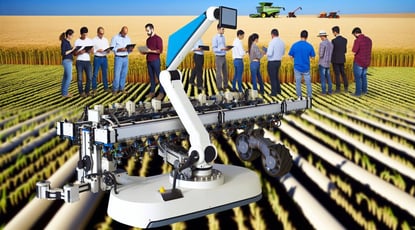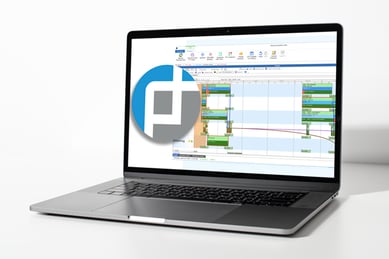Industrial Robotics for Agricultural Automation
The food and beverage industry faces numerous challenges, from meeting consumer demands for quality and sustainability to navigating supply chain complexities. Amidst these challenges, technological advancements offer a beacon of hope, particularly in the realm of industrial robotics for agricultural automation.
In this blog, we'll look into the transformative potential of integrating industrial robotics into food and beverage manufacturing, with a focus on how Production Planners can leverage these innovations for streamlined operations and enhanced productivity.

The Rise of Agricultural Automation
Traditionally, agriculture has been a labor-intensive industry, heavily reliant on manual labor for planting, harvesting, and processing crops. However, the advent of industrial robotics has ushered in a new era of agricultural automation, revolutionizing how food and beverage ingredients are cultivated and harvested.
One of the key drivers behind this shift is the pressing need to address labor shortages and rising labor costs in the agriculture sector. With industrial robots, tasks that were once performed manually can now be automated, reducing the need for human intervention and mitigating labor-related challenges.
Moreover, agricultural automation offers numerous benefits beyond labor efficiency. By leveraging robotics for tasks such as precision planting, selective harvesting, and crop monitoring, farmers can optimize resource utilization, minimize waste, and improve overall crop yields. This not only enhances profitability but also promotes sustainability by minimizing environmental impact.
Integration with ERP, SCM, and MES Systems
For Production Planners in food and beverage manufacturing facilities, integrating industrial robotics with enterprise resource planning (ERP), supply chain management (SCM), and manufacturing execution systems (MES) presents a significant opportunity to optimize production processes and maximize efficiency.
Platforms like PlanetTogether offer advanced planning and scheduling capabilities, allowing Production Planners to orchestrate production activities seamlessly. By integrating these systems with leading ERP solutions such as SAP, Oracle, Microsoft Dynamics, Kinaxis, and Aveva, planners can achieve greater visibility and control over their manufacturing operations.

Imagine a scenario where a food and beverage manufacturer aims to automate the processing of agricultural ingredients using industrial robots. By integrating PlanetTogether with their chosen ERP system, Production Planners can synchronize production schedules with real-time inventory data, ensuring optimal resource allocation and minimizing production downtime.
Furthermore, integration with SCM systems enables end-to-end visibility across the supply chain, facilitating timely procurement of raw materials and components. This not only enhances production efficiency but also improves responsiveness to changing market demands and supply chain disruptions.
Additionally, MES integration allows for seamless execution of production plans, with real-time monitoring of manufacturing processes and equipment performance. By leveraging data insights from MES systems, Production Planners can identify bottlenecks, optimize workflow, and drive continuous improvement initiatives.

Benefits of Industrial Robotics in Food and Beverage Manufacturing
The integration of industrial robotics into food and beverage manufacturing offers a plethora of benefits for Production Planners, including:
Improved Efficiency: Industrial robots can perform repetitive tasks with precision and consistency, reducing cycle times and increasing throughput.
Enhanced Quality Control: Robotics-enabled automation minimizes human error and variability, resulting in higher product quality and consistency.
Increased Flexibility: Robotic systems can be reprogrammed and reconfigured to adapt to changing production requirements, enabling greater flexibility in manufacturing operations.
Cost Savings: While the initial investment in robotics may be significant, the long-term cost savings through labor reduction, improved resource utilization, and minimized waste justify the investment.
Safety: By automating hazardous or physically demanding tasks, industrial robots improve workplace safety and reduce the risk of accidents or injuries.
Sustainability: Agricultural automation promotes sustainable farming practices by optimizing resource utilization, reducing chemical usage, and minimizing environmental impact.
Challenges and Considerations
Despite the numerous benefits, integrating industrial robotics into food and beverage manufacturing poses several challenges and considerations for Production Planners:
Technical Complexity: Implementing robotics requires expertise in robotics programming, system integration, and maintenance, which may pose challenges for organizations lacking the necessary skills and resources.
Initial Investment: The upfront costs associated with robotics implementation, including equipment purchase, installation, and training, can be substantial, requiring careful financial planning and justification.
Integration Complexity: Integrating robotics with existing ERP, SCM, and MES systems requires seamless data exchange and interoperability, which may necessitate customization and integration efforts.
Regulatory Compliance: Compliance with regulatory standards and safety requirements governing robotics deployment in food and beverage manufacturing is paramount, requiring adherence to industry guidelines and best practices.
Workforce Adaptation: The introduction of robotics may necessitate workforce reskilling and retraining to ensure smooth transition and acceptance among employees.
Maintenance and Support: Ongoing maintenance and support are essential to ensure the reliability and performance of robotic systems, requiring proactive monitoring and timely intervention.
Industrial robotics represent a game-changing technology for agricultural automation in the food and beverage industry. By integrating PlanetTogether with ERP, SCM, and MES systems, Production Planners can unlock new levels of efficiency, agility, and sustainability in manufacturing operations.
However, realizing the full potential of robotics requires careful planning, strategic investment, and collaboration across departments. Production Planners play a pivotal role in driving this transformation, leveraging technology and data insights to optimize production processes and deliver superior value to consumers.
As we look to the future, the convergence of robotics, AI, and data analytics promises to usher in an era of unprecedented innovation and growth in food and beverage manufacturing. Are you ready to take your manufacturing operations to the next level? Contact us today to learn more about how PlanetTogether can help you achieve your goals and drive success in your industry.


